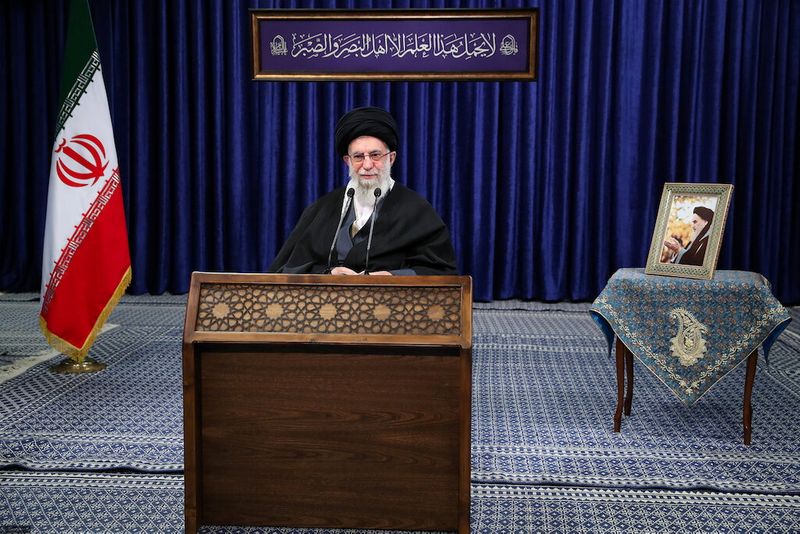
Iran’s Supreme Leader Ayatollah Ali Khamenei delivers a televised speech, in Tehran, Iran January 8, 2021. Official Khamenei Website/Handout via REUTERS
January 8, 2021
By Parisa Hafezi
DUBAI (Reuters) – Iran’s Supreme Leader on Friday banned the government from importing COVID-19 vaccines from the United States and Britain, labelling the Western powers “untrustworthy”, as the infection spreads in the Middle East’s hardest-hit country.
In a live televised speech, Ayatollah Ali Khamenei raised the prospect of the two Western countries, long-time adversaries of the Islamic Republic, possibly seeking to spread the infection to other countries.
He added however that Iran could obtain vaccines “from other reliable places”. He gave no details, but China and Russia are both allies of Iran.
“Imports of U.S. and British vaccines into the country are forbidden … They’re completely untrustworthy. It’s not unlikely they would want to contaminate other nations,” said Khamenei, the country’s highest authority.
“Given our experience with France’s HIV-tainted blood supplies, French vaccines aren’t trustworthy either,” Khamenei said, referring to the country’s contaminated blood scandal of the 1980s and 1990s.
Khamenei repeated the accusations in a tweet that was removed by Twitter along with a message saying it violated the platform’s rules against misinformation.
Iran launched human trials of its first domestic COVID-19 vaccine candidate late last month, saying it could help Iran defeat the pandemic despite U.S. sanctions that affect its ability to import vaccines.
Tensions between Washington and Tehran have risen since 2018, when President Donald Trump abandoned a 2015 nuclear deal and reimposed sanctions to pressure Iran into negotiating stricter curbs on its nuclear program, ballistic missile development and support for regional proxy forces.
In retaliation for U.S. sanctions, which were lifted under the nuclear deal, Tehran has gradually violated the accord. U.S. President-elect Joe Biden, who takes office on Jan. 20, has pledged to rejoin the agreement if Tehran also returns to full compliance.
Khamenei said Tehran was in no rush for the United States to re-enter the deal, but that sanctions on the Islamic Republic must be lifted immediately.
Iran’s utmost authority, Khamenei ruled out any talks over Tehran’s missile programme and Iran’s involvement in the Middle East, as demanded by the United States and some other major powers.
“Contrary to the U.S., Iran’s involvement in the region creates stability and is aimed at preventing instability … Iran’s involvement in the region is definite and will continue.”
Shortly before Khamenei’s speech, Iran’s elite Revolutionary Guards unveiled an underground missile base at an undisclosed Gulf location.
The West sees Iran’s missiles both as a conventional military threat to regional stability and a possible delivery mechanism for nuclear weapons should Tehran develop them.
But Iran, which has one of the biggest missile programmes in the Middle East, regards the programme as an important deterrent and retaliatory force against the United States and other adversaries – primarily Gulf Arabs – in the region in the event of war.
(Reporting by Parisa Hafezi; Editing by Toby Chopra, Timothy Heritage, William Maclean and Sonya Hepinstall)



